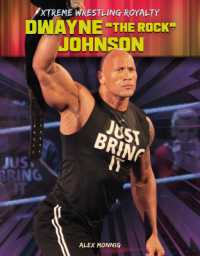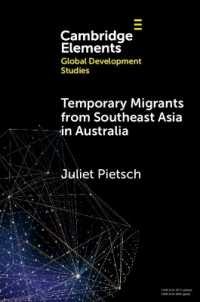Full Description
This is the first book to introduce qualitative research methods in the study of disability and physical education. It outlines key concepts and theories in disability and physical education, providing a platform for understanding, before exploring the full range of methodologies and techniques for research, data gathering, and data representation. Written by a team of leading researchers from around the world, every chapter introduces a research theory, approach, method, or tool; provides a critical discussion about how that theory, approach method, or tool has been used or might be used; and offers signposts to future directions for research in that area.
This book explores established research methods and cutting‑edge methods that are being applied to disability and physical education for the first time, from narrative inquiry, ethnography, and action research, to creative nonfiction, sensory methods, and participatory approaches. This book places an emphasis on approaches that consider disabled children and young people as active (rather than passive) agents involved in data gathering, and on ways in which researchers and research participants can utilise data to best represent views toward, and experiences of, disability and physical education.
This is an essential reference volume for any advanced student, researcher, pre-service educator, in‑service educator, or coach with an interest in disability and physical education.
Contents
PART 1
Theoretical and conceptual considerations for researching disability in physical education
1 Physical education, disability and qualitative research: what are we talking about?
Justin A. Haegele, Anthony J. Maher and Janine Coates
2 Ontological, epistemological and axiological considerations when using qualitative methods for researching disability in physical education
Nancy L. I. Spencer and Győző Molnár
3 Positionality and reflexivity in research about disability in physical education
Antonios Ktenidis and Anthony J. Maher
4 Intersectionality and disability in physical education
José Devís‑Devís and Víctor Pérez‑Samaniego
5 Critical‑Ableist perspectives in physical education
Martin Giese and Tobias Buchner
6 Posthumanism, disability and physical education
Kay Sidebottom and Kate Bancroft
7 Dignity in disability representation in physical education: see me for who I am
Donna Goodwin, Amanda Ebert, Morgan Cathcart,
Keith Gilliard, Bruce Fleming, Debra Kennedy, Phil Krol, Tonia LaRiviere, Christine Schuster and Armando Venditti
8 Rigour in qualitative research about disability in physical education
Anthony J. Maher
PART 2
Methodologies for researching disability in physical education
9 Narrative inquiry, disability and physical education
Marta Oliver‑Álvarez, Erica Bennett, Kassandra Welch and Javier Monforte
10 Using cripistemologies as a grounding for participatory research with communities that are non‑verbal: "What's best for you?"
Emma V. Richardson, Helen Black, Christian T. Wilson and Rebecca Foster
11 Appreciative inquiry in disability and physical education
Joanne Hill and Alex Baird
12 Phenomenological inquiry, disability and physical education
Maureen Connolly
13 Ethnography and disability in physical education
Colum Cronin
14 Life histories, disability, and physical education: recognising the path of inequality marked as destiny
Maria Luiza Tanure Alves, Isabella dos Santos Alves
and Náthali Fernanda Feliciano
15 Action research: a methodology to inform inclusive physical education
Kirsten Petrie, Kate Kernaghan and Patsie Frawley
16 Participatory research for examining disability in physical education
Janine Coates, Lesley Sharpe and Carolynne Mason
17 Co‑production, disability and physical education
Brett Smith and David Swanston
18 Grounded theory as a method for researching disability in physical education
Laura Davies
19 Reflexive thematic analysis, disability and physical education
Lisa R. Trainor and Andrea Bundon
20 Qualitative text analysis, disability and physical education
Sebastian Ruin
PART 3
Gathering and representing data from/with disabled children and young people
21 Individual and focus group discussions with disabled children and youth
Josephine Blagrave, T N Kirk, and Katherine Holland
22 Using photo‑elicitation with children for researching disability in physical education
Clare Woolhouse, Leon Fraser and Simon Dougherty
23 Using sensory methods for researching disability in physical education
James Brighton, Ben Powis and Laura Gubby
24 Dabbling, daubing and discovering: the value of arts‑based research in exploring the physical education and sporting experiences of young disabled students
Annette Stride and Hayley Fitzgerald
25 Keeping it real... using realist tales to understand special educational needs and disabilities in physical education
Alan Thomson, Jess Macbeth and Olivia Williams
26 Creative non‑fiction, disability and physical education
Daniel Martos‑Garcia, Wenceslao García‑Puchades, Bernat Espí and Rodrigo Atienza Gago
27 Visual representation of data in disability and physical education
Lesley Sharpe, Carolynne Mason and Janine Coates
28 Poetic representation of data in disability and physical education
Shrehan Lynch and Stephen Palmer
29 Physical education, disability, and qualitative research: concluding thoughts
Janine Coates, Justin A. Haegele, and Anthony J. Maher






